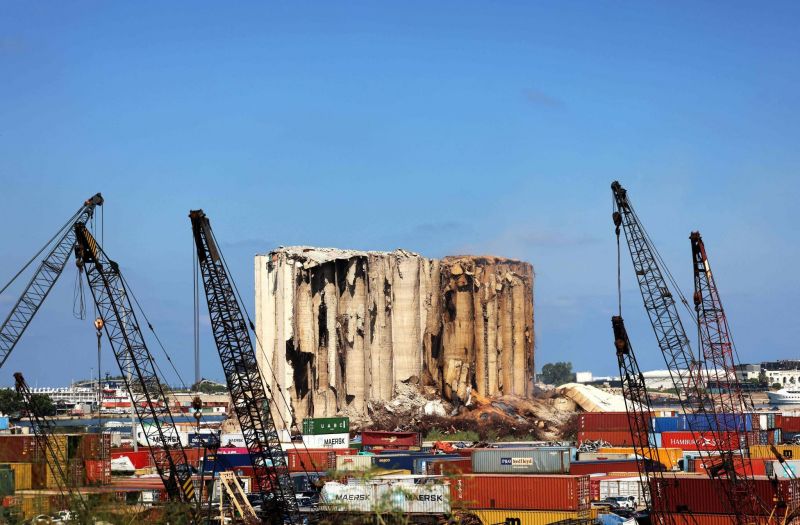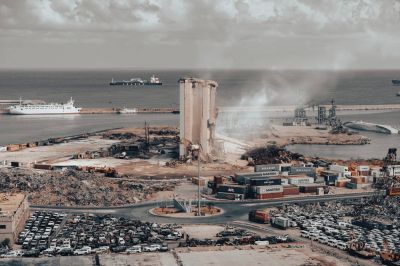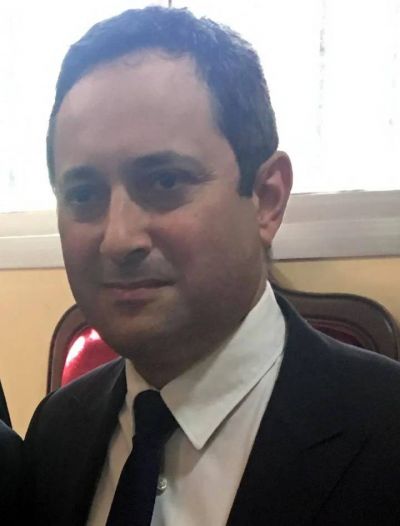
The middle grain silos at the Port of Beirut collapsed following the damage caused by the Aug. 4, 2020 massive explosion, on Aug. 12, 2022. (Credit: Joseph Eid/AFP)
Last week, Higher Judicial Council (HJC) President Souheil Abboud instructed the First President of the Beirut Court of Appeal, Habib Rizkallah, to rule on a case accusing lead investigative judge Tarek Bitar of “usurpation of power” about the probe into the 2020 Beirut port explosion.
In January, Public Prosecutor at the Court of Cassation Ghassan Oueidate filed a complaint against Bitar after the former was implicated in the investigation. At the time, Bitar decided to override the legal actions brought against him by several politicians accused in the case.
These legal actions have repeatedly impeded Bitar’s investigation since 2021. The probe is currently on hold since Oueidate’s filed the complaint against Bitar.
The appointment of Rizkallah as the investigating judge to resolve the dispute between the Oueidate and Bitar took place in May, just a few weeks before it was publicly announced.
However, as the third anniversary of the 2020 port blast approaches, the Lebanese public, including the victims’ families, eagerly awaits Bitar’s ability to reassume control of the case.
But there remains uncertainty about the progress of the proceedings assigned to Judge Rizkallah, or whether they have commenced at all.
According to a judicial source who spoke on condition of anonymity due to the sensitivity of the issue, strict confidentiality in cases involving legal actions between judges is crucial until a judgment is delivered.
“Consequently, within judicial circles, there is a reluctance to inquire about the actions Judge Rizkallah intends to take regarding his assigned role,” the source told L’Orient-Le Jour.
No need for interrogation?
The judicial source said Rizkallah should, in particular, look into the notion of “usurpation of power,” raising doubts that Bitar could be charged for implicating the public prosecutor
As an investigative judge at the Court of Justice, Bitar possesses extensive powers that allowed him to initiate proceedings against former Prime Minister Hassan Diab and even a sitting president, former President Michel Aoun, both in relation to the blast.
The judicial source suggested that Rizkallah is likely to rule in favor of Judge Bitar, emphasizing that he is known for his efficient case handling and is expected to deliver his judgment swiftly.
Bitar has not yet received a summons for a hearing.
Youssef Lahoud, a member of the Prosecution Office of the Beirut Bar Association, told L’Orient-Le Jour that there is a provision in the law that allows Rizkallah to render a decision without personally interrogating Judge Bitar.
Lahoud explained that under articles 63 and 84 of the Code of Criminal Procedure, the examining magistrate — in this case, Rizkallah — has the authority to reject the legal action initiated by Oueidate if he determines that it does not constitute a criminal offense.
This means that Rizkallah could conclude the investigation without questioning Bitar if he deems that the evidence gathered is sufficient to dismiss the case.
Lahoud explained that Judge Rizkallah’s verdict can only be rendered after considering the opinion of the public prosecutor, although this opinion is not binding.
He also mentioned that any decision made by Rizkhallah can be appealed by either Bitar or Oueidate to an indictment division, which would be appointed by HJC.
However, a timely establishment of this division is unlikely given that a HJC meeting requires a quorum of six members. Currently, only seven of the 10 seats are the council are filled.
Lahoud stressed that the composition of the indictment division must be approved by at least five council members. While Judge Oueidate may attend the meeting, he would not have voting rights for the appointment of magistrates to the court in question.
This article was originally published in French in L'Orient-Le Jour. Translation by Joelle El Khoury.

